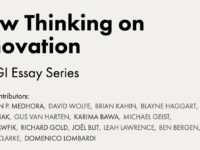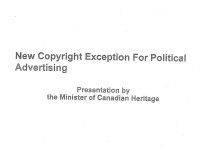The Centre for International Governance Innovation, the well-respected independent think tank based in Waterloo, has posted the first part of an exceptional new series on innovation. From the introduction from Rohinton Medhora to several pieces on innovation and trade (Kahin, Haggart, Ciuriak, and Van Harten), the series promises to provide politicians and policy makers with valuable insights to support the government’s focus on innovation. I was delighted to participate in the project with a piece titled How Trolls are Stifling Innovators, Gamers and Netflix Junkies.
The contribution, which is accompanied by a video on the impact of copyright and fair use on innovation, identifies several areas of copyright reform that are closely linked to innovation policy. These include copyright flexibilities such as fair use, the need to prevent IP and copyright misuse, and the harms associated with restrictive digital lock rules. The article starts by noting that the Supreme Court of Canada highlighted the link between copyright and innovation in the 2002 Theberge decision:











